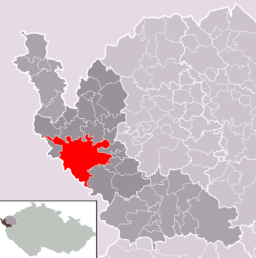Cheb
| Cheb | |||
| Town | |||
|
George of Podebrady square
|
|||
|
|||
| Country | Czech Republic | ||
|---|---|---|---|
| Region | Karlovy Vary | ||
| District | Cheb | ||
| Commune | Cheb | ||
| Elevation | 459 m (1,506 ft) | ||
| Coordinates | 50°04′46″N 12°22′14″E / 50.07944°N 12.37056°ECoordinates: 50°04′46″N 12°22′14″E / 50.07944°N 12.37056°E | ||
| Area | 96.37 km2 (37.21 sq mi) | ||
| Population | 33,351 | ||
| Density | 346/km2 (896/sq mi) | ||
| First mentioned | 1061 | ||
| - Town status since | 1179 | ||
| Mayor | Ing. Petr Navrátil (ČSSD) | ||
| Timezone | CET (UTC+1) | ||
| - summer (DST) | CEST (UTC+2) | ||
| Postal code | 350 02 | ||
|
Location in Cheb District
|
|||
| Statistics: statnisprava.cz | |||
| Website: | |||
Cheb (Czech pronunciation: [ˈxɛp]; German: Eger), is a city in the Karlovy Vary Region of the Czech Republic, with about 33,000 inhabitants. It is situated on the river Ohře (also called Eger in German), at the foot of one of the spurs of the Smrčiny and near the border with Germany. Prior to 1945, which saw the expulsion of the German speaking population, the town was the centre of the German-speaking region known as Egerland, and was part of the Northern Austro-Bavarian dialect area.
The name of the city was in 1061 recorded as Egire; in 1179 it was known as Egra; from 1322 as Eger and the surrounding territory as Regio Egere and Provincia Egrensis; after the 14th century also as Cheb or Chba. From 1850 it was given the twin official names of Eger and Cheb. From 1938 to 1945 it was one of the municipalities in Sudetenland.
The twin towns of Cheb are Hof in Germany, Rheden in the Netherlands, Nizhny Tagil in Russia and Bắc Ninh in Vietnam.
The earliest settlement excavated in the area was a Slavic stronghold at what is now called Jánský Vrch, north of the town-centre. In 807 the district of today's Cheb was included in the new margraviate of East Franconia, which belonged at first to the Babenbergs, but from 906 to the margraves (marquis) of Vohburg. Depold II of Vohburg built the castle about which the town then grew. In 1179 town status was achieved. In 1149, by the marriage of Adelheid of Vohburg to the emperor Frederick I, Eger (Cheb) came into the possession of the House of Swabia, and remained in the hands of the emperors until the early 13th century, during which time it became an Imperial Free City.
...
Wikipedia






